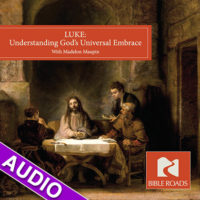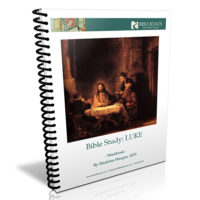It’s hard to focus too much on the resurrection. No one understood this better than Paul who preached it throughout his 30-year ministry. Writing to the Corinthians, he asks:
If Christ hasn’t been raised, then our preaching is useless and your faith is useless… then we deserve to be pitied more than anyone else (I Cor. 15:14, 19, Common English Bible).
Jesus’ resurrection forever answered the age-old question raised in Job:
If people die, will they live again? (Job 14:14, CEB)
Consider the huge domino-like events that fill this final chapter of Luke’s Gospel following the resurrection:
- The resurrection itself is confirmed by relaying the risen Christ Jesus’ appearances to his disciples in Jerusalem. (Compare this to the first Gospel, Mark, which has no post-resurrection occurrences.)
- We’re shown that all these passion-week happenings are the fulfillment of Scripture – from Deuteronomy, Isaiah, the Psalms, Daniel and more.
- That the breaking of bread, sharing a meal together in Christ’s name– regardless of the form it takes –is a way to celebrate and experience the presence of the risen Christ.
- The disciples are commissioned for their coming vital work that unfolds throughout the book of Acts to build the future Church.
Lest all of this seems hugely in the past, what about asking my favorite Bible study question: ‘so what’?! So what if there was a resurrection? How does it affect my life today? It’s not an empty tomb that is at the heart of Christianity, but the risen Christ who continues to comfort, heal, sew up our sorrows and wounds, set us on a new course or career, sooth over the hurdles of personal relationships, encourage us during traumatic times.
One way to make this resurrection season more than just an Easter holiday occurrence is to think how the risen Christ has impacted your life in just this past month. I suspect you can think of at least a dozen examples.
Looking closely at Jesus’ final resurrection appearance in Luke, to the eleven disciples in Jerusalem, there are parallels to his earlier appearance to the two walking to Emmaus. First, no one recognizes him. Next, he reminds them:
“These are my words that I spoke to you while I was still with you—that everything written about me in the law of Moses, the prophets, and the psalms must be fulfilled.” Then he opened their minds to understand the scriptures… (Luke 24:44,45, New Revised Standard Version)
Was pointing to prophesy about these astounding events of the past three days, Jesus’ way of helping to answer their doubts and calm their fears? Doubt’s contemporary ‘cousins’ –skepticism, suspicion, confusion, even cynicism –would tyrannize us today if not vigilant. Fear morphs into horror, alarm, angst, foreboding with every news cycle. Yet here is the risen Christ telling us how to work through each one: anchoring ourselves in the Scriptures’ timeless truths.
Would we also discover that grounding ourselves this way helps us see that God is in charge, always has been and always will be. That God is always providing a ‘way out’, as well as someone to show us that way, to demonstrate what is required to follow God’s leading, to show that the path won’t be easy but always with unimaginable victory and joy in the end.
The disciples had–and did–move from doubt and fear to building a church. That’s our mission as well.





Thank you, Madelon.
Each year Easter has meant more and more to me. The fact that he has risen is so powerful. Thank you for your insights.
~ Diane
Thank you for this blog post and for all of them. They are so helpful. I look forward to your newsletter each month.